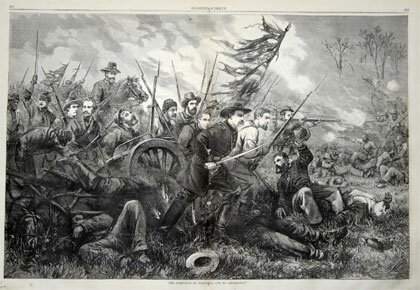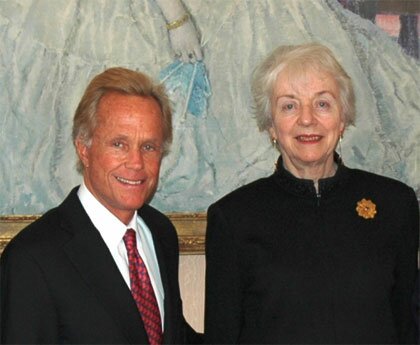Madeleine Kunin Fires On Patrick Leahy: The Bloody Civil War Comes to Vermont
There’s always a moment when every civil war, no matter how distant, finally finds its way home, when the sound of the guns comes down from the hills, when suddenly it’s your Union father who’s shot your Confederate uncle on a grassy hillside at Gettysburg, your mother left for dead by a homocidal Rebel who lost his mind, apparently, at Shiloh.

Today the Democrats’ Civil War came home to Vermont, and it’s been a strange thing to watch unfold in real time.
The facts themselves are easy to set up.
In an interview with VPR’s Bob Kinzel, aired today, Senator Patrick Leahy voiced an opinion that has gained no small currency over the last month: given that Barack Obama has what amounts to an insurmountable lead in delegates, popular vote, and states won, Hillary Clinton should think seriously about withdrawing gracefully from the race.
To quote Leahy exactly: “She ought to withdraw, and she ought to be backing Senator Obama. Now, obviously that’s a decision that only she can make. Frankly I feel that she would have a tremendous career in the Senate.”
Later, in a press release, Leahy put a slightly finer point on it: “Senator Clinton has every right, but not a very good reason, to remain a candidate for as long as she wants to.”
One final fact: Kinzel went for reaction to Hillary Clinton’s most vocal supporter in the state, former Governor Madeleine M. Kunin. Predictably enough, Kunin saw the issue quite differently. But it was her response that took the exchange to another place entirely.
“Admittedly, it’s tough for Senator Clinton to get a majority of the delegates but it’s not over till it’s over. It seems a bit patronizing to tell her, ‘Honey, you know you’ve got to drop out for the good of the Party.’ Sure it’s not easy, but I think the process has to go forward as it was designed to go.”
Tough to miss the import of Kunin’s riposte: Leahy is acting the part of the sexist male Senator, trying to maintain the Democratic Old-Boy network.

And just like that, one of VDB’s favorite Vermont political icons had winged another of VDB’s favorite Vermont political icons.
But like any good civil war skirmish, this one is susceptible to re-enactment, to figure out not just who shot whom, but whether they were shot according to the rules of engagement — or in the back.
To return to Leahy’s original statement, then, clearly the Senator backs Obama. He’s been a longtime supporter, and offered his formal support some months back. Is it beyond the pale for a supporter of one candidate to call for the end of a rival campaign?
Almost never, we would argue. At every step of every campaign, everyone calls for everyone to drop out: strong candidates always call for other candidates to stay on the sidelines before the race even starts, and every campaign eventually tries to leverage momentary advantage into a call to clear the field.
So even if Obama were tied with Clinton, Leahy’s remarks would not have been out of bounds. But given that Obama leads by every measure traditionally thought to matter (and putting aside some of the novel metrics the Clinton campaign has sought to introduce in the last few months), Leahy’s remarks were not only acceptable, but logical. And not simply logical, but courageous: the Clinton campaign has made very clear that they will personally attack those who attempt to bring the race to closure.
Bill Richardson, for instance, who worked in the Clinton Cabinet, could hardly have been surprised to be called a Judas not once but twice. But that didn’t make it sting any less, and that didn’t make it right.
So Leahy knew well enough, when he said what he said, that he would be attacked for it. But he took a stand anyway, and one very arguably consistent with the best interests of an antsy Democratic Party.

Kunin’s response, on the other hand, was a foul by any measure.
No one respects Madeleine Kunin more than VDB. She is a political legend in Vermont for good reason. She is savvy, elegant, and tough as nails, a trailblazing politican in a state known for same. But in this response to Leahy, she’s fallen into the tactics greenlighted by the Clinton camp and modeled for supporters at all levels: treat any attempt to total the score in the race as an act of betrayal at best, and a mark of crypto-sexism at worst.
And in that, Kunin has shown, yet again and much closer to home, why Clinton’s campaign has not taken fire. It is marked overall by a sense of affronted entitlement, although there are other reasons just as good for Clinton’s lagging performance.
And it’s worth noting: if anyone has access to, and effective control of, the Democratic Old Boy network this time out, it’s Hillary Clinton herself. Bill Clinton has called in every favor outstanding, and it was Hillary’s once-overwhelming advantage among party insiders (mostly male) that led the media to consider the race a tie for so very long.
To our mind, certain things have become undeniable over the last 14 months or so:
1) After having sold herself as the candidate of experience and competence, Clinton has seen her campaign outmaneuvered at every step of the game. The fact that she finds herself in the rear-guard position here in March has far less to do with lingering sexism than it has to do with strategic malpractice.
Her hard-boiled strategists, with names that capture perfectly the qualities they were thought to bring to the table — Wolfson, Ickes, etc. — have been at a complete loss for how to respond to a movement-based campaign. As a result, they’ve opted to co-opt Obama’s message; when that didn’t work, they attempted to hobble the messenger.
2) Clinton has run a campaign marked by consistent and methodical attempts to deny even the most commonly accepted facts on the ground. The spin from her spokespeople has become the stuff of Sunday editorial cartoonists for good reason. Her camp has campaigned more or less as Bush has governed, as though from a gated enclave far from the reality-based community.
Suggesting that the emerging winner of this long hard primary slog be given the nomination is nothing but increasingly common sense. Pat Leahy said nothing but what influential Democrats, men and women alike, are saying all across America. The Clinton camp’s preferred media frame — that Pennsylvania is the new Iowa, and somehow brings all indicators back to zero — hasn’t found a lasting purchase for good reason.
Kunin’s response, though, was out of bounds.
And given our lasting respect for her, we would take it as a momentary lapse, if the former Governor weren’t guilty of more or less the same lapse in her otherwise intriguing forthcoming book, Pearls, Politics and Power: How Women Can Win and Lead.
In Pearls, it’s the blogosphere itself that comes in for criticism as male-dominated and correspondingly sexist. To quote:
“Half of the 96 million bloggers are women, but of the 1,200 political bloggers who came to the YearlyKos convention in Chicago in 2007, the majority were men. Is it any surprise that Hillary got only 9 percent in most online-activist polls while garnering more than 40 percent in traditional polls?”
We’re not sure how Leahy felt, hearing Kunin’s criticism, but we know how we felt when we read the above quote: extremely puzzled.
To hear Kunin tell it, there is only one factor that accounts for Hillary’s typically abysmal showings in netroots polling, and that is gender. Yet female candidates all across the country have been propelled into office by the people-powered campaigns headed by DailyKos, OpenLeft and the Swing State Project.
In general, the blogosphere tends to sift for ideology, rather than gender, or race, or class.
In short, it isn’t Clinton’s pearls but her politics that have made her unpalatable to the netroots: her vote for the Iraq war, and subsequent inability to come clean about it to Democrats; her identification with the DLC, and the politics of triangulation; her saber-rattling in the Senate, etc. and so on ad infinitum.
On issues about which the netroots care deeply, Clinton has hobbled her candidacy. And that makes sense when one considers the strategic bent of Clintonism in general — to move the Democratic Party as close as possible to the GOP, while holding the line on two or three signature issues like reproductive choice to keep party activists from splintering.
And that worked well enough in the 1990’s, but post-Iraq it is all but unthinkable: we want broad-based change, and a chance to develop a 50-state majority that will make it feasible. That doesn’t make the netroots sexist; it makes us activist, and unapologetically so.

Obama’s first visit to Vermont, February 2006
Kunin does Clinton no favors, actually, with this sort of talk. And Clinton does her Party no favors when she models it at the highest level of the campaign.
But that’s the rub, of course: these sorts of prolonged battles cause people to lose sight of what helps and what doesn’t, cause them to attack old friends, family, people simply trying to do what they must.
Leahy has a stellar record on women’s issues; in the past, he has been of more than passing help to Kunin in some of her own tougher campaigns. He wouldn’t deserve her casual accusation even if they were strangers, but given their history it’s especially hard to understand.
But then civil wars always are.
No one, not even the living, left Shiloh whole.
on March 29th, 2008 at 10:35 pm
[…] As some of you may know, Sen. Leahy has received quite a bit of unfair criticism for this. See Philip Baruth’s Vermont Daily Briefing for more details on the “controversy”: https://vermontdailybriefing.com/?p=903 […]